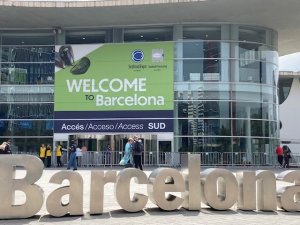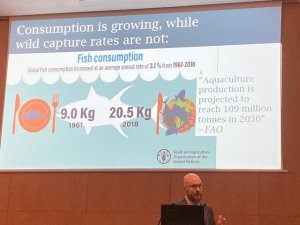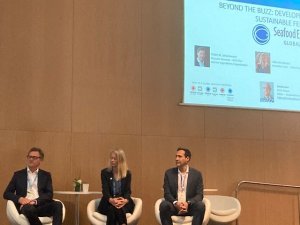 Seafood Expo Global was held in Barcelona from 26 to 28 April. A panel discussion took place to address the role of marine ingredients in aquafeed at a time when food security is more than ever a concern to everyone. Moderated by Seafoodsource’s journalist Chris Chase, the discussion started with a reference to the current buzz around novel ingredients. As a matter of fact, it was revealed earlier in April by a Nofima paper this year that novel ingredients keep increasing their share in feed for Norwegian farmed salmon but remain at a limited level of 0.4% of all feed ingredients. With a share at 20% in 2020, fishmeal and fish oil remain the benchmark in aquafeed.
Seafood Expo Global was held in Barcelona from 26 to 28 April. A panel discussion took place to address the role of marine ingredients in aquafeed at a time when food security is more than ever a concern to everyone. Moderated by Seafoodsource’s journalist Chris Chase, the discussion started with a reference to the current buzz around novel ingredients. As a matter of fact, it was revealed earlier in April by a Nofima paper this year that novel ingredients keep increasing their share in feed for Norwegian farmed salmon but remain at a limited level of 0.4% of all feed ingredients. With a share at 20% in 2020, fishmeal and fish oil remain the benchmark in aquafeed.
Petter Johannessen, IFFO's director general and one of the panellists, emphasised the importance of nutritional properties: “The nutritional platform behind the growth of aquaculture lies in fishmeal and fish oil’s nutritional profile” he said. With a deficit of 40 to 50 million metric tonnes of feed ingredients by 2030, it’s really not the time to create a buzz around feed, he insisted. “We need to add rather than replace feed ingredients" Jorge Díaz, Skretting’s sustainability manager agreed, adding that responsibly managed fisheries remain a credible source of feed ingredients.
 Fishmeal and fish oil will remain a platform to support the growth of the aquaculture sector. “Fish do need fish in their feed” Libby Woodhatch, Executive Chair at MarinTrust, insisted. “The value chain needs the assurances that our programme provides in order to meet retailers and consumers’ expectations” she insisted, outlining the key contribution that the MarinTrust Improver Programme is having in driving change : “Our programme helps pressurise local governments to implement regulations in fisheries, such as in Mauritania or Panama”she said. “Through improved management practices, the volume of higher quality byproducts is increased”.
Fishmeal and fish oil will remain a platform to support the growth of the aquaculture sector. “Fish do need fish in their feed” Libby Woodhatch, Executive Chair at MarinTrust, insisted. “The value chain needs the assurances that our programme provides in order to meet retailers and consumers’ expectations” she insisted, outlining the key contribution that the MarinTrust Improver Programme is having in driving change : “Our programme helps pressurise local governments to implement regulations in fisheries, such as in Mauritania or Panama”she said. “Through improved management practices, the volume of higher quality byproducts is increased”.
There is no such thing as waste, and 31% of all marine ingredients are produced from by products, according to IFFO’s latest calculations. This is a valuable raw material, all panelists agreed.
By products have amazing sustainability credentials, starting with their low carbon footprint.
 Jorge Díaz insisted that sustainability needs to be seen from different angles, not only carbon footprint, but also from a perspective that encompasses social impacts and trade offs. Claims should be underpinned by third party evidence.
Jorge Díaz insisted that sustainability needs to be seen from different angles, not only carbon footprint, but also from a perspective that encompasses social impacts and trade offs. Claims should be underpinned by third party evidence.
“We have to be holistic in our approach to impacts assessment and flexible in the way we use ingredients” he added. “Novel ingredients are needed and Skretting plans to use 5 to 10% of them in its feed by 2025. But they need to scale up and demonstrate their credentials from a holistic perspective”.
Collaboration is key to delivering the required amount of feed in order to nourish the planet. This is the aim of the Global Roundtable on Marine Ingredients which was launched in 2021 together with the Sustainable Fisheries Partnership. “We are keen on this initiative because it delivers concrete actions” said Jorge Díaz.
All panelists concluded by agreeing that increased communication efforts are needed to educate people on marine ingredients, relying on science based facts. “We need to be tangible and explain how we can make a difference“ Jorge Díaz insisted, highlighting that Skretting contributes to 21 million meals a day throughout the world.
Barcelona, 28th April 2022









